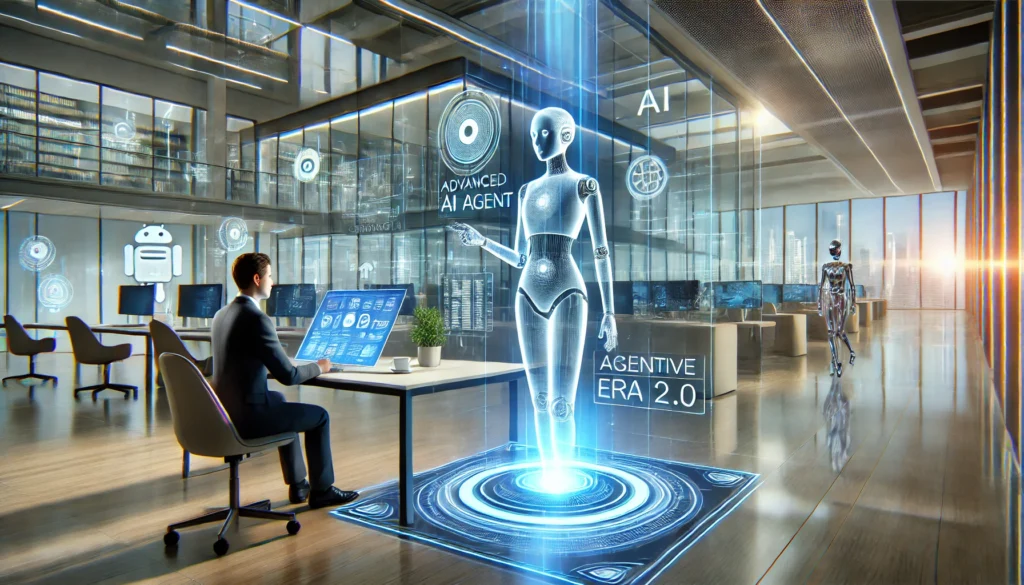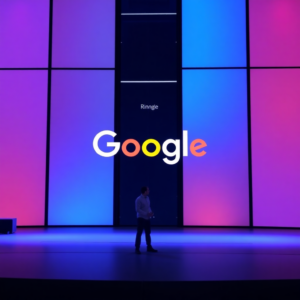Google Touts ‘New Agentic Era’ with AI Agents Powered by Gemini 2.0

The world of artificial intelligence (AI) is witnessing a paradigm shift as Google introduces what it terms the “new agentic era” with its latest AI model, Gemini 2.0. This innovation signals a leap forward in AI capabilities, blending groundbreaking advancements in generative AI with an emphasis on autonomous decision-making. Google’s AI agents, powered by Gemini 2.0, aim to redefine how humans interact with technology, pushing the boundaries of productivity, creativity, and personalized experiences.
What is the “Agentic Era”?
The term “agentic” derives from the concept of agency—the ability to act independently and make choices. In the context of AI, it refers to systems capable of taking initiative, performing tasks without constant human oversight, and adapting dynamically to their environments. This new era signifies a shift from passive AI systems, which rely heavily on direct user input, to active agents that anticipate needs, execute complex tasks, and collaborate with users in unprecedented ways.
Google’s CEO Sundar Pichai describes the agentic era as “a transformational step in the journey of AI,” emphasizing the potential for AI to act as a co-pilot for everyday tasks. “Gemini 2.0 is not just an upgrade,” Pichai explains, “it’s a reimagination of what AI can achieve when it’s proactive, context-aware, and seamlessly integrated into our lives.”
The Evolution of Gemini 2.0
Gemini 2.0 is the successor to Google’s Gemini AI model, which debuted in late 2023. While the original Gemini made headlines for its advanced natural language processing (NLP) and multimodal capabilities, Gemini 2.0 takes these features to the next level by embedding “agentic” functionalities.
The model is designed to:
- Understand Context: Gemini 2.0 leverages advanced contextual understanding, allowing it to process not just individual commands but the broader intent behind user interactions.
- Autonomously Perform Tasks: With agentic features, Gemini-powered AI can carry out complex workflows, such as planning travel itineraries, managing schedules, or even executing creative projects.
- Learn and Adapt: The model continuously learns from interactions, refining its performance and personalizing its responses over time.
- Collaborate Across Platforms: Gemini 2.0 seamlessly integrates with Google Workspace, Android, and third-party applications, offering a unified and responsive AI experience.
Key Features of AI Agents Powered by Gemini 2.0
1. Proactive Assistance
AI agents built on Gemini 2.0 are designed to predict user needs and take action proactively. For instance, an agent might:
- Suggest a response to an email based on previous conversations.
- Automatically organize documents shared in a meeting into a structured summary.
- Notify users of upcoming deadlines while offering assistance to complete tasks.
2. Advanced Multimodal Capabilities
Gemini 2.0 extends its multimodal functionality, allowing AI agents to:
- Analyze images, videos, and text simultaneously.
- Generate creative content like presentations, illustrations, or video scripts.
- Provide real-time feedback on multimedia projects.
3. Autonomy with Accountability
Google emphasizes the importance of building trust in agentic AI. Gemini 2.0 ensures transparency in decision-making by offering detailed explanations for its actions. Users can audit these processes, providing a balance between autonomy and accountability.
4. Enhanced Collaboration Tools
AI agents act as intermediaries in collaborative environments, streamlining communication, assigning tasks, and resolving ambiguities. For example, in a team project, the AI can:
- Identify conflicting schedules and propose optimal meeting times.
- Delegate responsibilities based on team members’ workloads and preferences.
- Monitor progress and provide updates to stakeholders.
5. Privacy and Security
As AI becomes more autonomous, concerns about data privacy grow. Google assures users that Gemini 2.0 adheres to the highest standards of security. Data processed by AI agents is encrypted, and users have granular control over what information the system can access and retain.
Real-World Applications
The agentic AI capabilities of Gemini 2.0 are already making waves across industries:
1. Education
Teachers and students benefit from personalized AI tutors powered by Gemini 2.0. These agents can:
- Create custom lesson plans tailored to individual learning paces.
- Provide instant feedback on assignments.
- Simulate interactive learning experiences with virtual environments.
2. Healthcare
In healthcare, Gemini 2.0-enabled agents assist doctors by:
- Summarizing patient records for quick reference.
- Suggesting potential diagnoses based on symptoms and historical data.
- Automating administrative tasks like appointment scheduling and billing.
3. Creative Industries
Artists, writers, and content creators use AI agents to:
- Brainstorm ideas collaboratively.
- Draft, edit, and polish creative works.
- Generate promotional materials, such as video teasers or ad copy, with minimal input.
4. Enterprise Solutions
Corporations leverage Gemini 2.0 to enhance productivity. For instance:
- Sales teams receive AI-generated insights into customer preferences.
- HR departments automate recruitment processes, from screening resumes to scheduling interviews.
- Product development teams use AI to simulate market reactions to new ideas.
Challenges and Ethical Considerations
While the agentic era promises numerous benefits, it also poses challenges:
1. Bias and Fairness
Despite advancements, AI systems can inadvertently reflect biases present in their training data. Google has invested in rigorous testing and diverse datasets to mitigate these risks, but the potential for bias remains a concern.
2. Job Displacement
The automation of complex tasks may impact certain job sectors. Google argues that Gemini 2.0 will create more opportunities by enabling humans to focus on creative and strategic endeavors, but the transition may not be seamless.
3. Over-Reliance on AI
As AI agents become more autonomous, there’s a risk of users becoming overly dependent on them. Google’s design philosophy aims to keep humans in control, but maintaining this balance is crucial.
4. Privacy Concerns
Even with robust security measures, users may hesitate to entrust sensitive information to autonomous systems. Building user confidence through transparency and control remains a priority for Google.
The Road Ahead
The launch of Gemini 2.0 and its agentic AI agents represents just the beginning of Google’s vision for the future. The company is actively exploring:
- Interoperability: Expanding integration capabilities to include a wider range of third-party tools and platforms.
- Human-AI Collaboration Models: Researching optimal ways for humans and AI to work together effectively.
- Ethical Frameworks: Developing global standards for responsible AI use.



